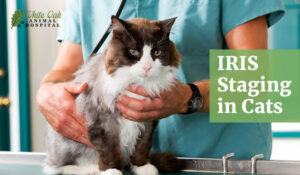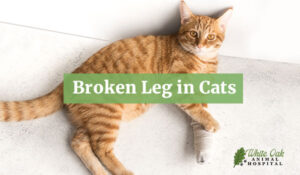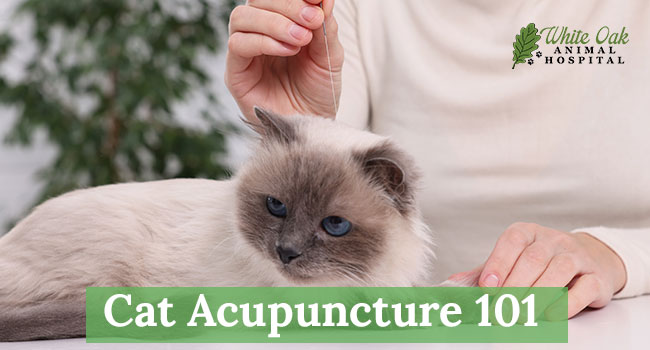
A veterinarian with specialized training in this field is pivotal in cat acupuncture. They assess whether your cat could benefit from this treatment modality. Often utilized for acute and chronic conditions, acupuncture is not typically offered as primary care in emergencies.
Acupuncture, a millennia-old treatment harmonizing with traditional medicine, has made significant strides in veterinary care, encompassing a broad spectrum of pet ailments, particularly in cats. Though predominantly associated with human healthcare, this ancient practice has become pivotal in veterinary medicine, offering a unique therapeutic approach for our feline companions.
Understanding Cat Acupuncture
Rooted in ancient medical traditions, cat acupuncture has emerged as a complementary treatment in modern veterinary medicine. This technique involves strategically placing fine, sterile needles at specific points on a cat’s body, known as acupoints. These points, meticulously mapped out over centuries, are believed to influence various physiological processes.
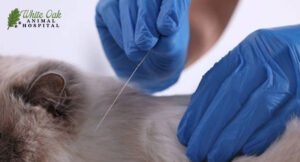 Primarily, cat acupuncture is recognized for its ability to stimulate nerve endings, enhance blood circulation, and facilitate the release of endorphins and other natural pain-relieving hormones. This holistic approach aims to restore balance within the body, often resulting in improved health outcomes for feline patients.
Primarily, cat acupuncture is recognized for its ability to stimulate nerve endings, enhance blood circulation, and facilitate the release of endorphins and other natural pain-relieving hormones. This holistic approach aims to restore balance within the body, often resulting in improved health outcomes for feline patients.
Veterinarians with specialized training in acupuncture assess the suitability of this therapy for individual cats, considering both the nature of the ailment and the cat’s overall condition. The versatility of cat acupuncture makes it an option for a range of health issues, from acute injuries to chronic diseases like osteoarthritis and gastrointestinal disorders.
Incorporating cat acupuncture into veterinary care symbolizes a shift towards a more integrative approach, blending conventional medical practices with traditional healing arts. This synergy of treatments offers a comprehensive path to wellness, underlining the evolving landscape of pet healthcare. As pet owners increasingly seek alternative therapies, cat acupuncture is a promising and innovative option for feline health management.
The Science Behind Cat Acupuncture
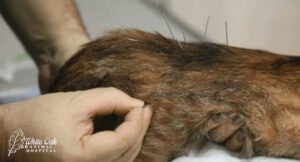 Integrating ancient practices with modern veterinary medicine, cat acupuncture involves placing fine needles at specific points, or ‘acupoints,’ on a cat’s body. This technique stimulates nerve endings, boosts blood circulation, and triggers the release of endorphins, aiding in pain relief, inflammation reduction, and anxiety alleviation in felines.
Integrating ancient practices with modern veterinary medicine, cat acupuncture involves placing fine needles at specific points, or ‘acupoints,’ on a cat’s body. This technique stimulates nerve endings, boosts blood circulation, and triggers the release of endorphins, aiding in pain relief, inflammation reduction, and anxiety alleviation in felines.
In ancient China, acupuncture has been a part of traditional medicine for millennia. Its adoption in veterinary medicine represents a significant shift towards holistic animal health care, blending time-honored methods with contemporary scientific understanding.
Veterinary acupuncture experts undergo extensive training, combining traditional acupuncture principles with current veterinary practices. This approach offers a complementary treatment option for various feline health issues, symbolizing the union of historical insights and modern medical advancements. Cat acupuncture exemplifies the growing embrace of alternative therapies in veterinary care, providing pet owners diverse options for managing their cats’ health and well-being.
Common Conditions Treated with Cat Acupuncture
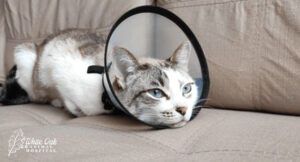 A wide array of feline conditions respond well to cat acupuncture. These include osteoarthritis and back pain, often seen in aging cats, where acupuncture provides significant pain relief. It’s also beneficial for cats recovering from injuries or surgeries, aiding in faster rehabilitation. Respiratory conditions like feline asthma, often challenging to manage, have shown improvement with acupuncture.
A wide array of feline conditions respond well to cat acupuncture. These include osteoarthritis and back pain, often seen in aging cats, where acupuncture provides significant pain relief. It’s also beneficial for cats recovering from injuries or surgeries, aiding in faster rehabilitation. Respiratory conditions like feline asthma, often challenging to manage, have shown improvement with acupuncture.
Furthermore, cat acupuncture is effective in treating behavioral and anxiety disorders, providing a calming effect. It also manages allergic dermatitis and gastrointestinal issues such as inflammatory bowel disease and constipation.
Through numerous case studies, veterinary experts have observed marked improvements in these conditions following acupuncture treatment. The precise mechanism involves stimulating nerves, increasing blood circulation, and releasing endorphins, reducing pain and inflammation. This holistic approach, blending ancient practices with modern veterinary techniques, offers a complementary solution, enhancing cats’ overall health and well-being.
The Benefits of Cat Acupuncture
Cat acupuncture, a blend of ancient practice and modern veterinary science, offers numerous benefits, making it an increasingly popular choice for feline health care.
Pain Management
Cat acupuncture excels in managing chronic pain conditions such as osteoarthritis and back pain. The technique involves stimulating specific points on the cat’s body, which helps reduce pain and enhance mobility. This approach is particularly beneficial for older cats more prone to joint-related issues.
Post-Surgical Recovery
Acupuncture aids in post-operative care for cats. Those who receive acupuncture treatments tend to show a quicker recovery rate post-surgery. This includes reduced pain and swelling, leading to faster healing and a shorter period of discomfort.
Treatment of Chronic Conditions
Chronic ailments in cats, including feline asthma, Feline Lower Urinary Tract Disease (FLUTD), and gastrointestinal disorders like inflammatory bowel disease, have shown positive responses to acupuncture. The treatment helps manage symptoms and improve the overall quality of life for cats suffering from these chronic issues.
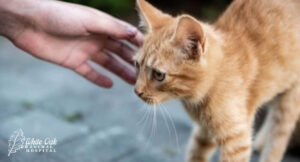 Stress and Anxiety Reduction
Stress and Anxiety Reduction
Cats are susceptible to stress and anxiety, which can manifest in various behavioral issues. Acupuncture is known for its calming effects, which can significantly improve a cat’s overall demeanor and stress levels.
Enhanced Circulation and Reduced Inflammation
Acupuncture stimulates acupoints, enhancing blood flow and reducing inflammation. This is crucial in speeding up recovery from injuries or surgeries and managing inflammatory conditions.
Considerations and Best Practices
When considering cat acupuncture, selecting a qualified and experienced veterinary acupuncturist is essential. This choice is pivotal for ensuring the safety and effectiveness of the treatment. Ideally, the veterinarian should have specialized training or certification in veterinary acupuncture. This expertise typically involves extensive coursework and hands-on experience, ensuring that the professional is well-versed in the theory and practice of animal acupuncture.
Safety is paramount in cat acupuncture. Sterile, single-use needles are a standard practice to prevent infection. Additionally, a thorough veterinary examination should precede any acupuncture treatment to identify any underlying health conditions that might contraindicate the use of acupuncture.
It’s also vital for cat owners to have realistic expectations and a clear understanding of what acupuncture can and cannot achieve. While acupuncture benefits a range of conditions, it is not a panacea. In emergencies, for instance, it should not replace conventional veterinary care.
There are common misconceptions about cat acupuncture that need addressing. Some people believe it is a painful process for the animal, but in reality, it is generally well-tolerated by cats, and many relax or even fall asleep during treatment. Others may question the scientific basis of acupuncture. However, numerous studies have shown its efficacy in various conditions, including pain management and chronic illness treatment.
Before starting treatment, it’s essential to discuss the frequency and duration of sessions with the veterinarian, as these can vary based on the cat’s specific condition and response to treatment. The cost of acupuncture can also vary, so discussing pricing and any available packages upfront is advisable.
Acupuncture, when administered by a skilled and experienced veterinarian, can play a significant role in enhancing your cat’s quality of life. It offers a gentle, yet effective approach to managing various health conditions, contributing to a happier and healthier life for your pet.
 For those seeking expert care in cat acupuncture, White Oak Animal Hospital stands as a commendable choice. Under the guidance of Dr. Casey Damron, with over 28 years of experience and more than 6,000 pets treated, your feline friend will receive the highest level of care. Dr. Damron’s expertise in Traditional Chinese Veterinary Medicine (TCVM) and acupuncture ensures a comprehensive approach to your cat’s well-being.
For those seeking expert care in cat acupuncture, White Oak Animal Hospital stands as a commendable choice. Under the guidance of Dr. Casey Damron, with over 28 years of experience and more than 6,000 pets treated, your feline friend will receive the highest level of care. Dr. Damron’s expertise in Traditional Chinese Veterinary Medicine (TCVM) and acupuncture ensures a comprehensive approach to your cat’s well-being.
White Oak Animal Hospital not only offers in-person consultations but also embraces modern technology with TCVM Telemedicine consultations. This innovative approach allows for greater flexibility and convenience, making holistic pet care more accessible.
Frequently Asked Questions
What specific conditions in cats can acupuncture effectively treat?
Cat acupuncture is effective for a variety of ailments including chronic pain conditions like osteoarthritis, behavioral and anxiety disorders, feline asthma, gastrointestinal issues, and post-surgical recovery. It’s a versatile treatment modality addressing both physical and emotional health issues in cats.
How does cat acupuncture differ from traditional veterinary treatments?
Unlike traditional veterinary treatments that often rely on medication, cat acupuncture offers a non-invasive approach, focusing on stimulating the body’s natural healing processes. It’s used alongside or as an alternative to conventional treatments, especially when seeking a holistic approach with minimal side effects.
What qualifications should a veterinarian have to perform acupuncture on cats?
A qualified veterinary acupuncturist should have specialized training or certification in veterinary acupuncture. This usually involves comprehensive coursework and practical experience, ensuring proficiency in both the theory and application of acupuncture for animals.
Related Posts
-
Cat Diarrhea and Vomiting Herbal Remedies
Cat diarrhea and vomiting can be alarming for pet owners. If your pet vomits more…
-
Acupuncture Pet Clinic in Fairview: Unlock the 4 Powerful Benefits of Acupuncture
Finding the best acupuncture pet clinic in Fairview can be difficult. In recent years, interest…
-
Cat Liver Problems and Herbal Solutions
Cat liver problems are extremely common. Firstly, the liver is important for many bodily functions.…
-
Best Cat Allergy Treatments For Your Pet
Once your veterinarian confirms your pet’s cat allergy diagnosis, work together on a treatment plan.…








